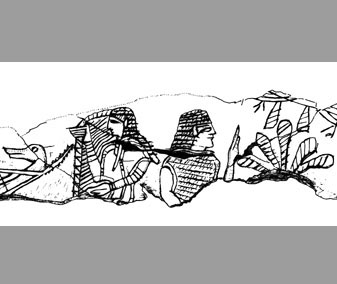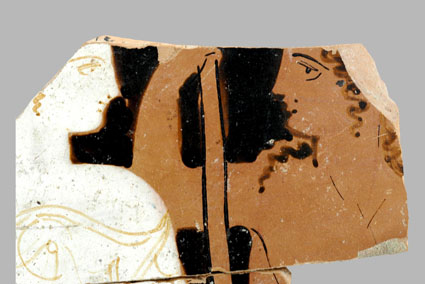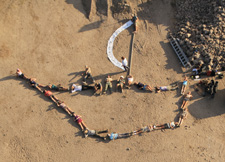Expedition goals
 The primary goal of the excavation is to
provide a large and well stratified data-base
for the study of the different coastal cultures and their overseas connections. These
include the SKL ('Sea People')
culture in the Early Iron Age and the
Phoenician culture - from its birth
in the Early Iron Age through its changing fortunes and manifestations under ever-changing
economic systems and political regimes
(Israelite,
Assyrian, Babylonian,
Persian,
Hellenistic and
Roman.
Other aims are the study of the role of Dor and other Mediterranean ports in the
political and economic structure of the largely
land-locked eastern empires
- Assyria and Persia. Persian to Roman Dor is used as a departure point for studying
the process of the Hellenization
and later Romanization of the East;
with particular regard to the role of the Phoenician trading emporia, with their
long-standing interaction with the Western Mediterranean.
The primary goal of the excavation is to
provide a large and well stratified data-base
for the study of the different coastal cultures and their overseas connections. These
include the SKL ('Sea People')
culture in the Early Iron Age and the
Phoenician culture - from its birth
in the Early Iron Age through its changing fortunes and manifestations under ever-changing
economic systems and political regimes
(Israelite,
Assyrian, Babylonian,
Persian,
Hellenistic and
Roman.
Other aims are the study of the role of Dor and other Mediterranean ports in the
political and economic structure of the largely
land-locked eastern empires
- Assyria and Persia. Persian to Roman Dor is used as a departure point for studying
the process of the Hellenization
and later Romanization of the East;
with particular regard to the role of the Phoenician trading emporia, with their
long-standing interaction with the Western Mediterranean.
 The different archaeological periods found at Dor reflect the wide-ranging
history of the land and peoples of Israel throughout its existence. The
present consortium has chosen to focus on a rather more limited number
of periods, however, in which the information obtained at Dor can both
illuminate wider vistas of life and social interaction in the ancient
Mediterranean, and pertain to those general inquiries of cultural
composition and transformation that are at the forefront of
contemporary investigations. Our widely-ranging and integrative
research strategy, as well as the exceptional composition of our
investigative team, are uniquely suited
to this exciting new study.
You can read more about our research topics here.
The different archaeological periods found at Dor reflect the wide-ranging
history of the land and peoples of Israel throughout its existence. The
present consortium has chosen to focus on a rather more limited number
of periods, however, in which the information obtained at Dor can both
illuminate wider vistas of life and social interaction in the ancient
Mediterranean, and pertain to those general inquiries of cultural
composition and transformation that are at the forefront of
contemporary investigations. Our widely-ranging and integrative
research strategy, as well as the exceptional composition of our
investigative team, are uniquely suited
to this exciting new study.
You can read more about our research topics here.
